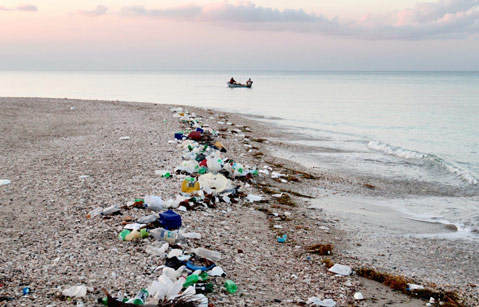The Crushing Problem of Ocean Plastics
Millions of Tons of Trash Choke the Seas Worldwide

Plastic waste littering the ocean isn’t something people want to think about. Everyone has seen pictures of the garbage patches located in isolated areas of the ocean. It’s horrifying, but not something we see often in the Isla Vista area, except after a particularly infamous Floatopia celebration.
You can, however, see the trash-to-ocean connection in real time while living in I.V. A tipped-over trash can, or items discarded in the parks, can be blown around, or otherwise redirected, and end up in the ocean. While this type of litter is just a small part of a huge problem, it illustrates the way plastic waste ends up in the ocean.
How Much?
While everyone knew that the amount of plastic waste ending up in the ocean was a huge problem, until now, no one has tried to quantify the amount. Researchers from UC Santa Barbara recently conducted a study to identify the amount of floating plastic waste that enters the ocean. Scientists from the school’s National Center for Ecological Analysis and Synthesis (NCEAS), with support from the Washington, D.C.-based Ocean Conservancy, found that between 4.8 million to 12.7 million metric tons of plastic waste enter the oceans each year (a metric ton is equal to 1,000 kilograms or 2,205 pounds).
One of the study’s co-authors, Roland Geyer, an associate professor at UCSB’s Bren School of Environmental Science & Management, illustrated how large this amount is by saying “Using the average density of uncompacted plastic waste, 8 million metric tons — the midpoint of our estimate — would cover an area 34 times the size of Manhattan ankle-deep in plastic waste.”
Researchers who conducted this study, which was recently published in the journal Science, used worldwide data on solid waste, population density, and economic status to estimate the amount of land-based plastic waste that entered the ocean. In addition, lead author Jenna Jambeck, an environmental engineer at the University of Georgia, coordinated with experts in oceanography, waste management, and plastics materials science to compile information for the study.
A map was compiled to show which countries produced the most plastic waste (the darker the color of the country the more plastic waste being released into the ocean):

Not surprisingly, the United States is one of the countries that produces a substantial amount of this trash, and the figure is predicted to rise. The study states: “Without waste management infrastructure improvements, the cumulative quantity of plastic waste available to enter the ocean from land is predicted to increase by an order of magnitude by 2025.”
Possible Solutions
Researchers from this study concluded that cleaning up the ocean would not be a viable option; it would not be cost effective. Instead, the solutions involve better waste management programs, a greater emphasis on recycling and reusing materials, and better product design. In addition, they suggested enhanced recovery systems to retrieve waste before it ends up in the ocean, and holding producers responsible for trash.
We know that ignoring this problem could have devastating consequences. We’ve seen pictures of sea animals that have died because of plastic waste, and we know that even the smallest species are affected by this problem. One of our primary food sources is being defiled, which could affect our eating habits and have a negative economic impact.
Since Isla Vista is a beach community, it is a great place to bring this issue to the forefront. It could become a place where this problem is highlighted and discussed. As the community moves toward some form of self-government, these types of issues can be used to create a shared feeling of community and the feeling of working toward the greater good.
I.V. may be a small beach community, but it could become known as a model for environmental stewardship. We could work as a community to improve waste management techniques, and emphasize the need to recycle and reuse items. In addition, community members could be held responsible for their trash. I.V. could become known as a beautiful beach town with an environmental bent, instead of a place associated with partying, mayhem, and tragedy.



